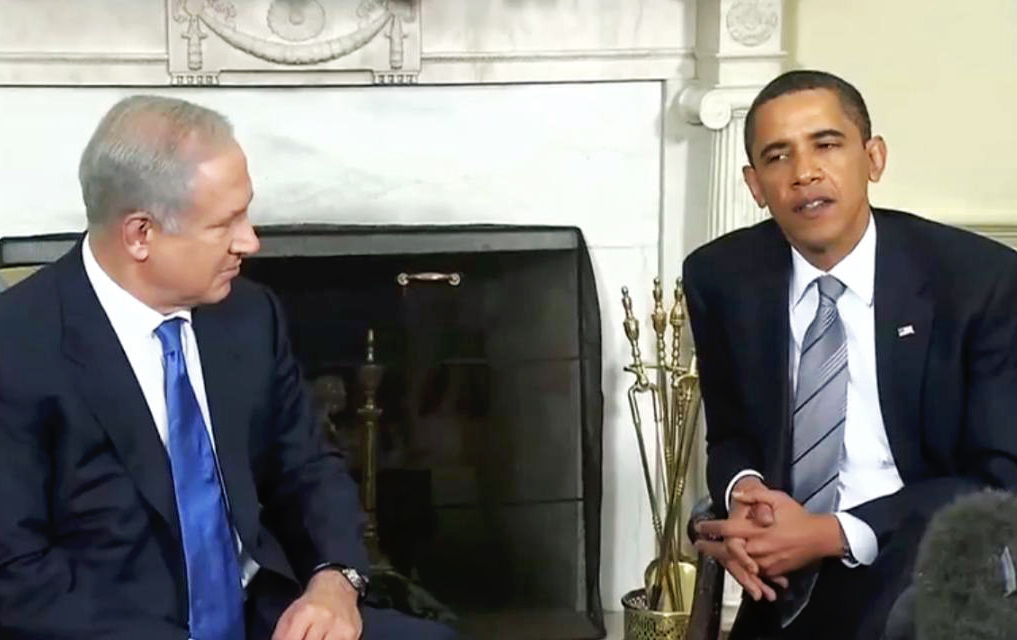At the United Nations last week, Mahmoud Abbas, President of the Palestinian Authority, applied for statehood for the Palestinian Territories. Given the media circus surrounding the issue, let’s ignore the conflict in the Middle East itself and look at how it applies to domestic policy and politics.
The media has been inundated with reports that Jews will desert the Democratic Party in the 2012 presidential election over President Barack Obama’s perceived weak support for Israel. The most recent flood of articles came last week after Republican Bob Turner’s upset victory in the special election for former Rep. Weiner’s traditionally Democratic congressional seat in Brooklyn. Rep. Turner’s campaign made the President’s Israel policy a key issue in the solidly Jewish district. Many analysts argue that this large group of Jews defected from the Democratic Party over President Obama’s Israel policy and contend that this reflects a national trend that will be seen in 2012.
Jews have always overwhelmingly voted Democratic, with 78% voting for Obama in 2012. Although the Jewish demographic is not large enough to directly influence vote counts, it is important to elected officials because of Jews’ outsized role in political activity through campaign donations, activism and influential roles in business and politics.
New York’s Ninth Congressional district contains a high proportion of Orthodox Jews and Russian-Jewish immigrants who supported Turner. These groups generally hold particularly hard-lined views on Israel, supporting expansionist and hawkish policy as well as socially conservative policy that the majority of Jews do not share. The demographics of the district make it difficult to use it as evidence that Jews will desert the President in 2012, especially over Israel.
Critics of the President’s Israel policy specifically point to two issues: the administration’s call to freeze Israel’s settlement expansion in the West Bank, and the President’s speech on Mid-East policy last May to base borders with Palestine on the 1967 borders with mutual land swaps.
The Obama administration’s settlement policy is no different than any presidents’ since Nixon; all have opposed settlement building. This administration simply chose to enunciate their policy. Any characterization of the administration’s position on the settlements as weak is a total misrepresentation of 40 years of policy.
The same goes for the President’s call to base peace talks between Israel and Palestine on the 1967 borders with mutual land swaps – it is well known that any peace resolution would be based along these borders. The President, wisely or unwisely, chose to enunciate it. The discontent among many Israel supporters over this issue was made worse by lazy journalism – the media harped on the “’67 borders” line, often ignoring the President’s call for “mutual land swaps that reflect realities on the ground.”
The media has also failed to mention that during this so-called cooling of relations between Israel and the U.S., aid has flowed to Israel at consistently high rates, sanctions on Iran have increased in frequency and the administration has taken great lengths to vouch for Israel diplomatically. Most recently, the President spoke against the Palestinian Authority‘s bid for statehood at the United Nations last Wednesday and promised to veto any resolution when it reached the UN Security Council.

Despite all of this, it’s unclear if Jewish-Americans will desert President Obama in 2012 over a perceived weakness in his Israel policy. True, recent polls have shown that President Obama’s support has diminished among his Jewish voters. The most recent poll conducted by Gallup in July showed the President’s support among Jewish voters at 60%, down from 68% in May and 88% in 2009. However, the President’s support has slipped amongst the entire country. In fact, in its analysis of the data, Gallup writes that the “monthly trend in Jewish approval of Obama continues to roughly follow the path of all Americans’ approval of the president, more generally, as it has since Obama took office in January 2009.”
What all of this suggests is that Jews are not single-issue voters. If this constituency chooses to vote for a Republican in 2012, it will not just be over Israel but for the same reasons that other voters do – a weak economy, high unemployment and four years of bitter partisanship in Washington.
I would argue that the right wing has never been able to understand why Jewish-Americans, who tend to come from higher-than-average socioeconomic status and are therefore statistically more likely to be Republicans, continue to vote overwhelmingly Democratic. To capture a voting bloc they see as rightfully theirs, the Republican Party has sought to make Israel a wedge issue in order to bring Jewish-Americans to the other side of the aisle.
The politicization of the Israel-Palestine issue insults the complexity and the severity of the situation at the expense of good policy. President Obama’s Israel policy has reflected the opinions of the majority of moderate voters and has been consistent with past policies. Reports of Jewish defection from the Democratic Party in 2012 over the President’s Israel policy are overblown and only serve to further the Republican Party’s plan to capture the Jewish vote.
American Jews who are rightly concerned about the security of Israel and wish for a peaceful long-term solution should look at exactly what Obama has done to support Israel. They should not only rely on how the media and pundits choose to spin the administration’s policy towards Israel, but also continue to look at the President’s record in aggregate.
The Tsuris is an excellent article on the Obama Administration’s role in the Peace Process via New York Magazine.


5 Comments on “Opinion: Obama, Israel, and Electoral Politics”